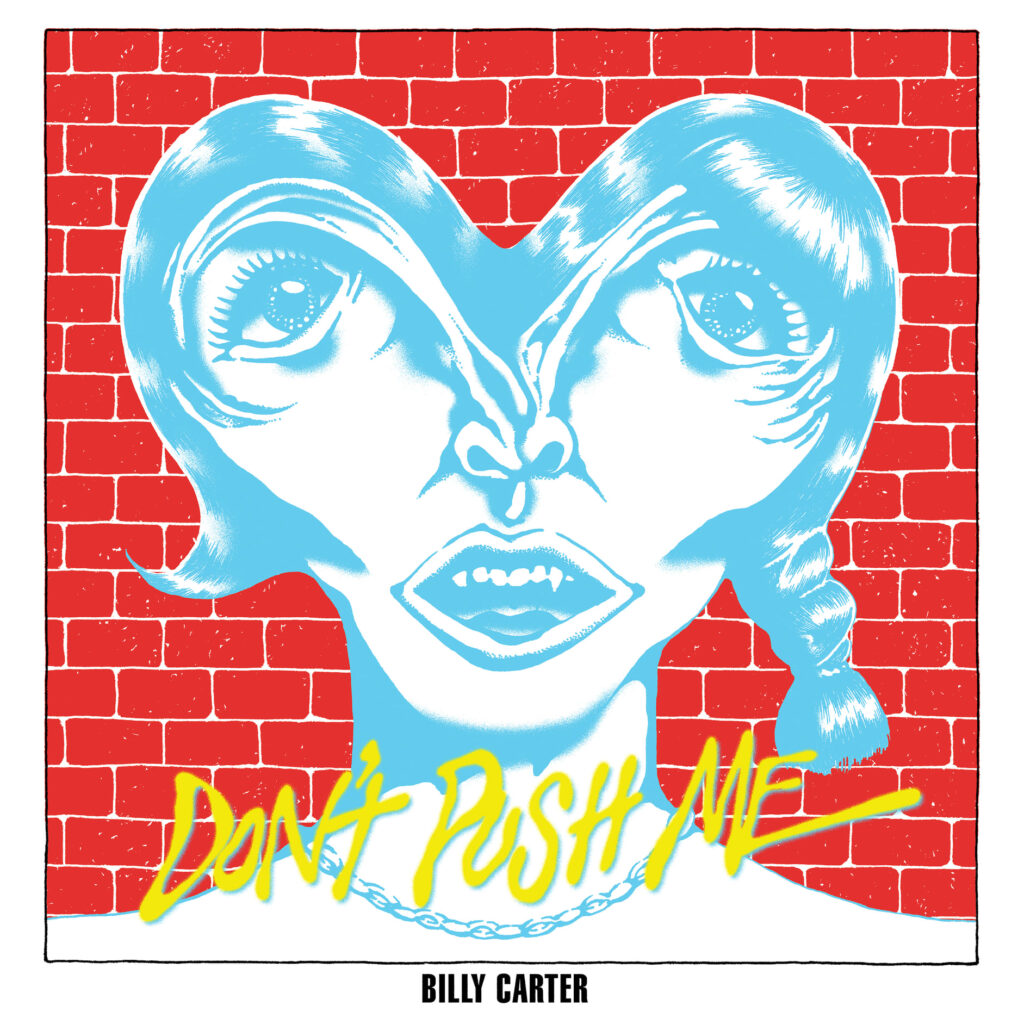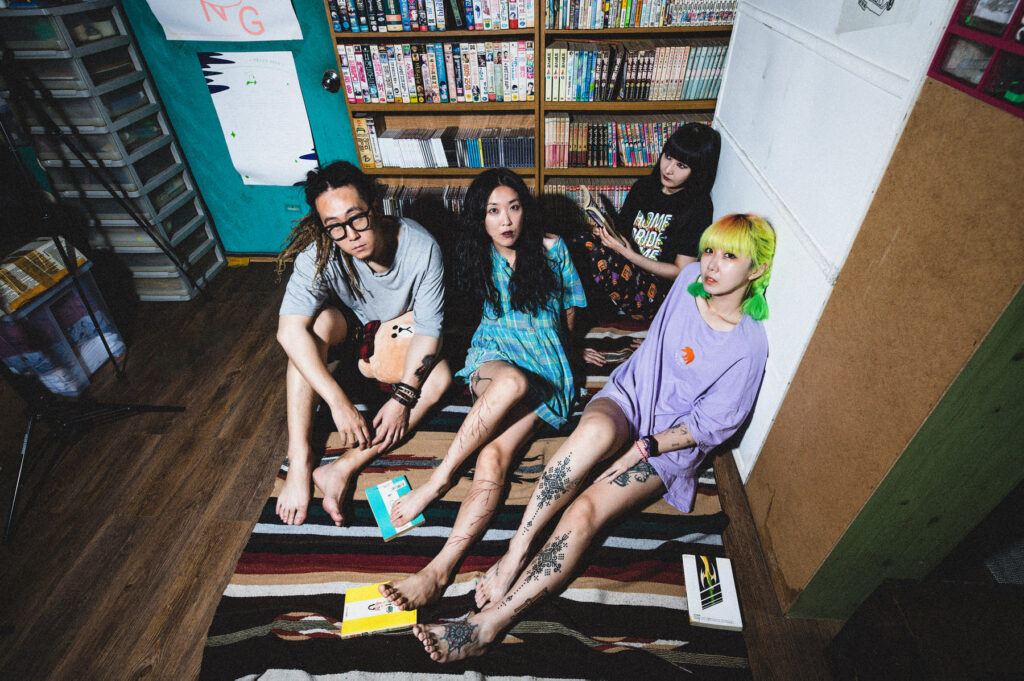
Self-described as a psychedelic blues band, Billy Carter have defined their sound with rolling guitar refrains, call and response vocals, and the contrast between the sensual vocals and the roughness of the rock behind them. While they are a Korean group, their songs are often in English, making them all the more accessible to international listeners. The frankness of their lyrics was what initially drew me to the band at the 2019 Zandari Festa. With 2020 being a hellscape for many, the release of their second full album Don’t Push Me in September could not have come at a better time. And, oh boy, does Billy Carter have something to say.
Warning: this review contains discussions of abuse, suicide and violence.
Originally a duo of Kim Jiwon (vocal, keyboard) and Kim Jina (guitar, vocal), with the addition of drummer, Billy Carter released their first EP The Red in 2015 — earning the group three Korean Music Awards. Their next EP, The Yellow followed in 2016 and the year culminated in the release of their first full-length album, Here I Am.
Here I Am was a groundbreaking moment for the group, pulling together the lyrical threads of love, pain, regret, and resentment that had been seen in previous EPs and crafting them into a 13 track story of an ambivalent relationship. Starting off early with the idea of “Love and Hatred” the album progressed through pleading in “I’ll be a Good Girl,” and eventually apathy with “Don’t Give a Shit.” The album’s dramatic shifts from fun, chaotic chants in the opening to more subdued, soulful vocals in the final moments made for a compelling story that truly cemented the group’s sound and showed off their poignant lyricism. Beyond that, the confidence and unapologetic emotions of the lyrics set it apart. Feelings are contradictory — hot one moment, cold the next — and Kim Jiwon has an amazing gift of expressing each with uninhibited conviction.
Here I Am was followed by two subsequent EPs, The Orange (2016) and The Green (2017). These albums presented a more experimental side of the group by adding synth, hand drums, acoustic guitars, and at times a more psychedelic tone than previous releases. Nonetheless, the frankness of the lyrics maintained through the playful sounds of The Orange and somber mood of The Green.
Billy Carter have — up until this year — made the most of rhythmic guitar refrains in lieu of a bassist. However, 2020 is a year of experimentation for seemingly everyone, and the group welcomed their third and fourth members, drummer You Yeonshik and bassist Kong Jin for the album Don’t Push Me. And what an album it is. If Here I Am was a raw, honest look at a relationship dissolving, then Don’t Push Me continues as a frank conversation — or musing — about those stories excluded from polite society, and the pain that comes with keeping all those thoughts inside. The result is one of the most poignant, brutally honest, and confrontational K-indie releases of the decade.
When listening to Don’t Push Me, the initial thought is that this is not an album meant to simply be enjoyed: it’s an album that is meant to be heard. The lyrics aren’t easy to listen to; at first listen I cycled through rage, solidarity, heartbreak, and more. Yet, it prompts multiple listenings, each time revealing another facet of society that you may have otherwise not thought of.
Don’t Push Me marks a change of sonic pace for the group by setting aside the usual sung vocals of Kim Jiwon and Kim Jina and focusing much more on spoken word. With the exception of a couple tracks, the album plays like a confession of the group’s heaviest thoughts over guitar refrains with the occasional harmonica solo. This was a smart decision for Billy Carter as it made the album feel more like a speech act, one that prompts the listener to listen closely and try to understand the narratives presented.
As mentioned before, with Billy Carter, no topic seems off the table. The album begins with the title track “Invisible Monster,” which in addition to being one of the only sung tracks on the album, expresses the anxiety and ultimate victory of leaving an abusive relationship. The relationship may be with society or an individual, but what matters more is that they’ve managed to move beyond it. It’s a strong note to kick off an album off, immediately declaring “I’m not scared of you, I’m not gonna be like you.”
This liberation makes way for more discussions of independence. After promptly rage-ing out and declaring to the audience “Don’t Push Me to Love my Enemy,” Billy Carter move into some important discussions of sexism. Whether it’s the normalization of abuse in “I Got Beat Up” or the call for bodily autonomy in “My Body, My Choice,” Billy Carter aren’t afraid to defend the idea that their life is their own, despite those societal influences that try to control them or tell them how to feel.
Some random guys
tried to teach me a lesson
They said they always know
better than me
I got beat up coz I said No!
beat up coz I said Don’t!
I got beat up coz I was being me
In “My Body, My Choice,” the group has taken the pro-abortion slogan and expanded to the full range of self-expression and identity– no matter how you may perceive my appearance, it is my decision how to conduct myself. It’s no wonder this track was chosen as the second title to the album, it has the potential to become an anthem for many people who are simply seeking recognition of their own bodily autonomy in an increasingly critical society.
My hair (my choice)
My facial expression (my choice)
My bra or not (my choice)
My body (my choice)My sexuality
My gender identity
With who I want to be
If I keep my pregnancy
My choice

The album takes a broader turn in the second half, moving away from the self and towards society’s judgment and expectations. In particular, “I See You” is a call out to all the idiosyncrasies of society that reinforce belonging and exclusion and, in my opinion, is the most telling song on the album. Is it the traditionally black, straight hair that makes someone Korean? Is Korea really free of misogyny simply because it is egalitarian? Why do we hold these perceptions of our national identity when there are so many outliers that exist in society as well? Billy Carter address these myths head-on, showing how society reinforces those who belong, and tells those on the fringes that they are wrong. What matters most to Billy Carter is that those excluded are seen, these contradictions acknowledged, and they have every right to be heard.
We learnt nothing about misogyny
Cause we’ve already accomplished the gender equality
When I was six my teacher asked me what my mum’s roll in the family
I answered my mum drives!
She’s fantastic at driving
not about cooking not cleaning
not washing nor housewifing
Then my teacher said that’s wrong
Cause her role is being a good wife, good mother, and good daughter in law
Not a good driver
This sets the scene for the remainder of the album, which chastises those who are on the inside, and speaks to those on the outside; more specifically, it examines what news we care about and what becomes white noise. “Dead Bodies” with its nonchalant delivery addresses South Korea’s suicide problem in a way I’ve never encountered before. Beyond listing all the personal experiences of losing a loved one to suicide or drunk driving, what resonates is the refrain of “you killed me, you killed us.” Society has molded a reality where the loss of life is commonplace, yet how society’s ills lead to the death of “my friend” is less often discussed. Death becomes an isolated incident, rather than a chronic ill of society itself.
Despite all the ways society may try to limit a person’s expression and push them to the fringes, it is through this fear of difference that Billy Carter find power. It is not the individual expression that is the problem, it is the fear of those judging them that is the real issue. In one of the most poignant breakdowns of the album, Billy carter makes clear that hatred is really an expression of fear– more importantly that fear is contagious, and those who are feared hold the real power.
You think you just don’t like us
But actually you hate us
You think you just a little hate us
But actually you fear us
The album concludes with a more subdued declaration of “Leave Me Alone.” The guitars and vocal tones as well take a more apathetic turn. Exhausted of being ridiculed and scrutinized, the only real goal is to end the judgment, the expectations. “Just let me be as me, just the way I am,” is the most fitting conclusion to the album. Through constant criticism, it is easy to retreat to just “me and my home, me and my google home,” begging for society to stop bothering you for your perceived discretions. Despite all the power of the previous tracks the conclusion shows that, in the end, discrimination and fear, however empowering, still lead to a sense of isolation. While it’s a more somber note to end such a powerful album on, it’s also entirely fitting.

Billy Carter have truly grown thematically and in terms of execution through the release of Don’t Push Me. The album is political, empowering, angering, and tragic all at the the same time — and maybe that’s exactly what we need right now. You don’t need to agree with every track, what matters is that you listen to the personal accounts of the artists behind it. The album is immaculately composed, written, and executed, and that alone deserves all the praise one can give. While it marks a change of pace for the group sonically, the lyrics alone prompt a close listening and respect for the care with which they are delivered. If you’re looking for an Indie Gem to rock out to, or simply to find solidarity with, I wholeheartedly recommend you to give Billy Carter’s discography a listen.


